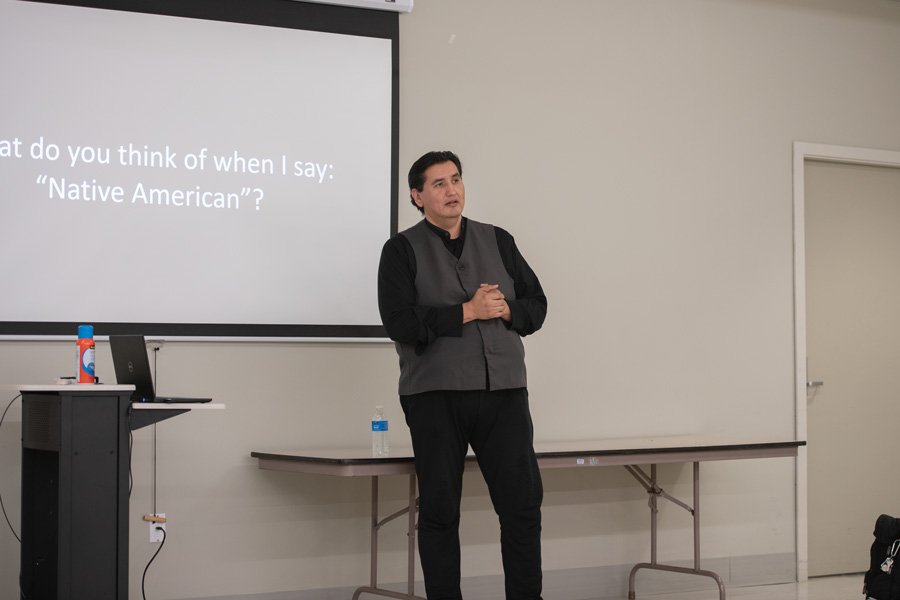Media educator Ernest M. Whiteman III speaks about Native American media representation
Daily file photo by Caroline Megerian
Ernest M. Whiteman III speaks at an event in 2020. At Tuesday’s virtual event, he discussed representation of Native Americans in media.
October 13, 2021
For people who might attend this presentation in the future, the following article reveals the presentation’s surprise ending.
Ernest M. Whiteman III spoke about Native American media representation and its real-world ramifications in his virtual presentation hosted by Evanston Public Library Tuesday night.
Whiteman — a Northern Arapaho media educator, filmmaker and writer — addressed stereotypes around Native Americans, authentic representation and erasure. He also spoke with the audience about their preconceived ideas of Native Americans.
“When it comes to how Natives are represented and how it affects Native Americans, I always ask people to imagine something,” Whiteman said. “Imagine that whenever you meet a person, that they have already made up their mind about you. They have already decided about you all these things because you are a Native American.”
Library assistant Kellye Fleming, who organized the event, said the presentation was particularly timely given that Indigenous Peoples’ Day was the day before.
Fleming said she hoped attendees would learn about the impact media representation has on perceptions of Native Americans.
“(Representation) is kind of like a mirror to our world,” Fleming said. “Who is seen and who isn’t seen, and what that means for the people that get to see themselves and then the people that don’t get to see themselves.”
In the talk, Whiteman examined tropes throughout television and film surrounding Native Americans. He discussed the violent “savage” and villain stereotypes, as well as the subservient “good Indian.”
Whiteman said this depiction perpetuates the idea that Native Americans are “always the enemy to defeat” — an idea that leads to violence against Native people.
Moreover, films and TV shows commonly display Native Americans as stuck in the past and out of touch with modernity, he said, noting the pattern appeared in shows ranging from “Star Trek” to “Little House on the Prairie.” Whiteman linked that stereotype to erasure of Native American perspectives.
“When you get depictions that sort of continually drop us in the past, there’s this ownership that happens by non-Native audiences that think they can do whatever they want because Natives are vanished,” Whiteman said.
He said Native Americans should be the ones telling Native American stories.
Whiteman pointed out how Native-led shows like “Rutherford Falls” and “Reservation Dogs” have become a hot topic in popular culture. However, he said, positioning two shows — which each have flaws — as the only ones with accurate Native American representation burdens them.
As Whiteman discussed positive representation, he challenged the idea that better shows are emerging only now. He pointed to “Northern Exposure,” which aired between 1990 and 1995, as an example of an older Native American-led show. He also talked about recent examples of representation driven by Native American writers, actors and directors.
For some members of the audience, like Evanston resident Nancy Braund, the presentation helped encourage a deeper look at representation.
“It got me thinking about how films especially have done a poor job of representing people who are quote: ‘different,’” Braund said.
At the end of Whiteman’s talk, he emphasized how media depictions erase real Native Americans. On the shared Zoom screen, he put up an image of two drawings of Native Americans. He then asked the audience which of the figures on screen was a better representation of Native Americans.
After a discussion about the stereotypes in both images, Whiteman pointed out that he, too, was visible on the screen. He said that by showing representations of Native Americans, he rendered himself invisible. The representations, rather than the reality, were what captured people’s attention.
“Representation matters, right?” Whiteman said. “It influences how people interact with Native Americans, in every gamut of society.”
Email: avivabechky2025@u.northwestern.edu
Twitter: @avivabechky
Related Stories:
— Chicago’s Indigenous community, politicians rally for recognition of Indigenous Peoples’ Day


